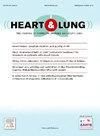vidatalkTM 通信应用程序对重症监护病房家庭心理症状的初步疗效:试点研究。
IF 2.4
4区 医学
Q2 CARDIAC & CARDIOVASCULAR SYSTEMS
引用次数: 0
摘要
背景:重症监护病房患者的家庭护理人员在机械通气期间与患者沟通时会遇到困难。人们对重症监护病房中患者与家属的沟通以及相关的情绪困扰知之甚少:研究 VidaTalk™ 交流应用程序对家庭护理人员焦虑、抑郁和创伤后应激障碍相关症状的初步影响:我们采用重复测量法进行了一项前瞻性研究,将 VidaTalk™ 与注意力控制条件进行了比较。28 名无声成人重症监护病房患者的家庭护理人员参与了这项研究。在患者接受机械通气治疗期间,干预组接受 VidaTalk™,而注意力控制组则接受装有 MyChart Bedside (EPIC) 和游戏应用程序的标准平板电脑。分别在基线、拔管/ICU 出院时、ICU 出院后 1 个月、3 个月和 6 个月测量了家庭看护者的焦虑和抑郁程度(医院焦虑抑郁量表)。创伤后应激障碍相关症状(事件影响量表修订版)的测量时间为 1、3 和 6 个月。对家属感知到的沟通困难、焦虑和抑郁进行了 T 检验,对创伤后应激障碍相关症状进行了 Mann-Whitney U 检验:结果:在家庭心理结果的变化方面,各组之间没有发现明显的统计学差异,但在一个月后,VidaTalk™ 与焦虑症状的小幅至中度改善(d = 0.43)有关。与 AC 组相比,VidaTalk™ 组的创伤后应激障碍相关症状较低,一个月时效果中等(ɳ2=0.07),三个月时效果中等至大(ɳ2=0.09):VidaTalk™显示了作为家庭护理干预措施的潜力,可能与减少家庭心理症状有关。本文章由计算机程序翻译,如有差异,请以英文原文为准。
Preliminary efficacy of the vidatalkTM communication application on family psychological symptoms in the intensive care unit: A pilot study
Background
Family caregivers of ICU patients experience difficulty communicating with patients during mechanical ventilation. Little is known about patient-family communication in the ICU and the associated emotional distress.
Objectives
To examine the preliminary effects of the VidaTalk™ communication app on anxiety, depression, and PTSD-related symptoms among family caregivers.
Methods
We conducted a prospective study using repeated measures to compare VidaTalk™ to an attention control condition. Twenty-eight family caregivers of nonvocal adult ICU patients participated in this study. The intervention group received VidaTalk™, whereas the attention control group received a standard tablet loaded with MyChart Bedside (EPIC) and game apps during the patient's mechanical ventilation treatment. Family caregiver anxiety and depression (Hospital Anxiety and Depression Scale) were measured at baseline, at extubation/ICU discharge, and 1-, 3-, and 6-months post-ICU discharge. PTSD-related symptoms (Impact of Event Scale-revised) were measured at 1-, 3-, and 6-months. T-tests were used for group comparisons for families’ perceived communication difficulty, anxiety, and depression, and Mann-Whitney U tests were used for PTSD-related symptom comparisons.
Results
No statistically significant difference was found between groups in changes in family psychological outcomes, the VidaTalk™ was associated with a small to medium improvement in anxiety symptoms (d = 0.43) at one month. The VidaTalk™ group had lower PTSD-related symptoms than the AC group with a medium effect size (ɳ2=0.07) at one month and a medium-to-large effect size (ɳ2=0.09) at three months.
Conclusions
: The VidaTalk™ demonstrated potential as a family caregiving intervention that may be associated with reduced family psychological symptoms.
求助全文
通过发布文献求助,成功后即可免费获取论文全文。
去求助
来源期刊

Heart & Lung
医学-呼吸系统
CiteScore
4.60
自引率
3.60%
发文量
184
审稿时长
35 days
期刊介绍:
Heart & Lung: The Journal of Cardiopulmonary and Acute Care, the official publication of The American Association of Heart Failure Nurses, presents original, peer-reviewed articles on techniques, advances, investigations, and observations related to the care of patients with acute and critical illness and patients with chronic cardiac or pulmonary disorders.
The Journal''s acute care articles focus on the care of hospitalized patients, including those in the critical and acute care settings. Because most patients who are hospitalized in acute and critical care settings have chronic conditions, we are also interested in the chronically critically ill, the care of patients with chronic cardiopulmonary disorders, their rehabilitation, and disease prevention. The Journal''s heart failure articles focus on all aspects of the care of patients with this condition. Manuscripts that are relevant to populations across the human lifespan are welcome.
 求助内容:
求助内容: 应助结果提醒方式:
应助结果提醒方式:


